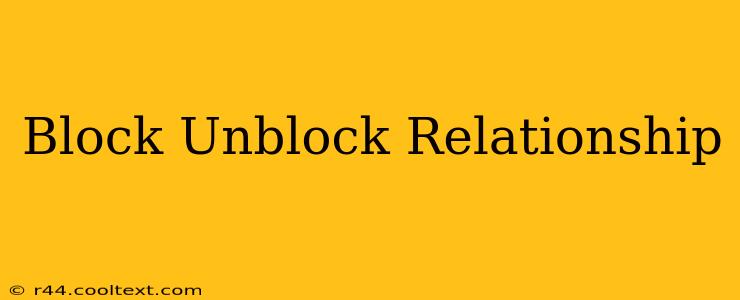The internet has revolutionized how we connect, but it's also introduced new layers of complexity to relationships. One of the most striking examples of this is the "block, unblock" phenomenon. This seemingly simple action – blocking and then unblocking someone – can carry significant weight, revealing much about the dynamics of online interactions. This post delves into the psychology behind blocking and unblocking, exploring the various reasons people engage in this behavior and offering advice on how to navigate these situations.
Why Do People Block on Social Media and Messaging Apps?
Blocking someone on social media or a messaging app isn't always a straightforward act of anger or dislike. It can stem from various reasons:
-
Need for Space and Boundaries: Sometimes, a block is simply a necessary boundary to create distance and protect mental health. Overbearing contact, unwanted attention, or toxic interactions can lead to someone needing to take a break from the other person's online presence.
-
Protecting Mental Health: Repeated negativity, harassment, or triggering content can severely impact mental well-being. Blocking becomes a self-preservation mechanism, shielding individuals from harmful interactions.
-
Ending a Relationship (or Trying To): A block can be a definitive statement signaling the end of a relationship, online or otherwise. It's a way to cut off contact and prevent further interaction. However, this method isn't always clean or clear-cut.
-
Temporary Cooling-Off Period: Sometimes, a block is a temporary measure, a way to cool down during a disagreement or heated moment. It allows both parties some space to reflect and calm down before communication can resume.
The Meaning Behind Unblocking: A Deeper Dive
Unblocking someone after a period of blocking can have many interpretations, some more complex than others:
-
Regrets and Second Thoughts: Unblocking can indicate a change of heart, a recognition of the impact of the block, or a desire to re-establish communication.
-
Testing the Waters: Unblocking without direct contact might be a way to gauge the other person's reaction and see if they'll reach out. It can be a cautious approach to reconciliation.
-
Accidental Unblocking: Sometimes, unblocking is accidental – a simple slip of the finger. While seemingly minor, it can still be significant depending on the context.
-
Manipulation and Control: In less healthy dynamics, unblocking and re-blocking can be a form of manipulation, a way to keep someone engaged in a cyclical pattern of attention-seeking behavior.
How to Handle Being Blocked and Unblocked
Being blocked or unblocked can be emotionally challenging. Consider these points:
-
Respect Boundaries: Even if you disagree with the block, respecting the other person's decision is vital.
-
Self-Reflection: If you've been blocked, reflect on your behavior and interactions. Were there any contributions to the situation?
-
Open Communication (When Appropriate): If you feel it's appropriate and the relationship warrants it, consider reaching out and having an open conversation about why the block occurred. This requires mutual respect and willingness to engage constructively.
-
Seek Support: If you're struggling with the emotional impact of being blocked or unblocked, seek support from friends, family, or a mental health professional.
Conclusion: Understanding the Nuances of Online Interactions
The act of blocking and unblocking is far from simple; it's a complex interplay of emotions, intentions, and communication styles. Understanding the underlying reasons for these actions can help navigate the intricate landscape of online relationships, fostering healthier and more constructive interactions. By respecting boundaries and engaging in open communication (when appropriate), you can foster stronger and more meaningful online connections. Remember that healthy relationships are built on mutual respect and understanding.

